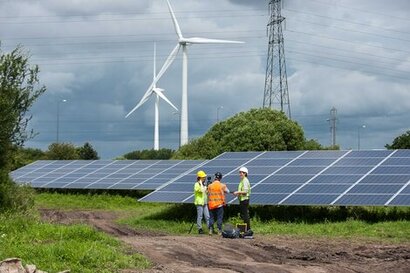
The new Ipsos poll commissioned by Bristol Energy Cooperative (BEC), a community-owned energy coop, shows, when asked “How much, if anything, do you personally know about the concept of 'Community Energy'?” only 1 percent of respondents know a great deal about the concept of community energy. 13 percent of respondents stated they know something about this concept (know a great deal (1 percent), a fair amount (2 percent) or just a little (10 percent)), with 26 percent overall saying they have heard of this (know a great deal/a fair amount/just a little (13 percent) or have heard of this, but know almost nothing about this (13 percent)).
BEC is calling on the government to invest significantly more money in community-owned renewable energy and improve public awareness. Community energy is a democratic and fair way of developing energy that benefits everyone.
After being asked about the concept, those taking the survey were then given the following information about community energy:
Community Energy refers to:
Projects where a community comes together to generate, manage and/or reduce their own energy.
These projects can involve a variety of technologies such as solar panels, wind turbines, hydroelectric power, etc.
The community is involved in the process, either through direct ownership, decision-making, or benefits sharing.
Once informed about community energy, almost half of those surveyed (47 percent) agreed (Strongly agree (12 percent) or Tend to agree (35 percent)) that community energy is a more sustainable way of generating electricity than electricity produced by large suppliers. Around half of respondents (49 percent) agreed (Strongly agree (11 percent) or Tend to agree (38 percent)) that community energy can be a source of income for local communities who use it.
What makes community energy different from big profit-making energy companies like Shell and BP is that revenues go into community funds for local environmental initiatives and provide bill savings to host sites, such as in Bristol.
In 2023, the government has committed a mere £10 million towards community energy, a drop in the ocean compared to initiatives such as £20 billion for Carbon Capture, Usage and Storage, a technology with significant scientific doubts.
In a year that has seen the climate crisis accelerate worldwide, BEC is urging the government to invest significantly more in community energy and promote it to the public as a trusted way to provide cheaper, reliable renewable energy to local people.
“Our poll is a wake-up call for the government” said Andy O’Brien, Co-founder and Director of BEC. “People are being kept in the dark about the best energy solution to the climate emergency, one that empowers communities and greatly helps people struggling during a cost of living crisis. As we enter another difficult winter, it’s time for everyone to have the chance to join the community energy movement with its huge untapped potential.”
Emma Bridge, Chief Executive of Community Energy England, added that community energy is the big green elephant in the corner of the energy room and that from villages to cities, community organisations are helping homes become cosier, greener, and cheaper to run.
“But this is done on a shoe-string” said Ms Bridge. “Government really needs to step up its support for this vital community resource.”
For additional information:

